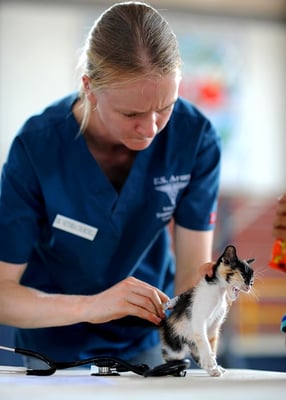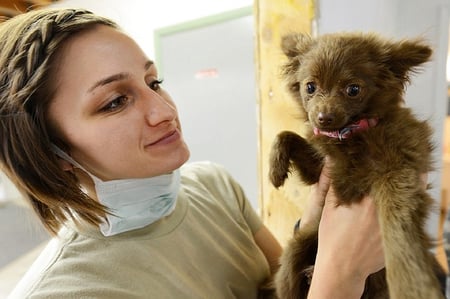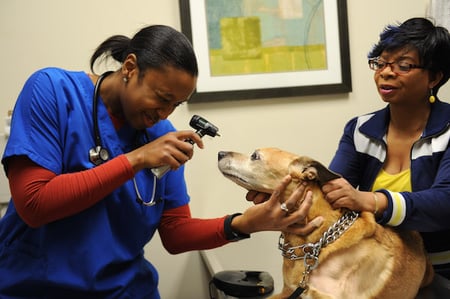how to become a vet
It's quite likely that your first encounter with a veterinarian happened when your pet was sick and needed a little extra care. That's because a veterinarian's primary job is to care for animals! Working with cute, cuddly critters is part of the appeal of the job--in fact, "veterinarian" is one of the most common responses from kids when they're asked what they want to do when they grow up! If you're interested in becoming a vet, it's a good idea to know quite a bit about the profession. In this article, we'll talk about what vets do, what kinds of degrees and licenses they hold, how long it takes to become a vet, and what kinds of personal qualities it takes to succeed in the profession. We'll also walk you through the process of becoming a vet step by step to help you prepare for your dream career. We'll cover everything you need to know, including: So let's get started! By definition, a veterinarian is a doctor who is qualified to practice the science of prevention, cure, and alleviation of disease and injury in animals. Veterinarians work to diagnose, treat, and research medical conditions of pets, livestock, and other animals. Put another way: if it has wings, a tail, or scales, there's probably a vet whose job it is to keep it happy and healthy. At this point, you might be wondering how long it takes to become a vet. Generally speaking, it takes about 8-10 years from when you graduate high school to become a vet. After completing an initial four-year bachelor degree program, it takes an additional four years of vet school to become a Doctor of Veterinary Medicine (DVM) and obtain licensure to practice in your state. If you wish to concentrate on a specific niche, such as cardiology or neurology, you'll need two or more years of specialized training on top of that. How long it takes to become a vet can vary, but if you really love animals and think caring for them is up your alley, then becoming a veterinarian may be the right choice for you. The process of becoming a veterinarian and practicing veterinary medicine requires some pretty serious dedication to the field. Veterinarians spend their entire lives improving their skill sets and contributing to the field, just like doctors who treat humans. That's why it's important to really think about whether you're a good fit for the profession. Here are four personal qualities to consider when thinking about how to become a veterinarian and if the field is right for you. Unfortunately, vets don't always encounter the animals they love in the best condition. Depending on the specialty, vets will have to see animals in distress or in the last moments of their lives. There will be tough decisions to make and there will be heartbreak. If you are unable to put aside your love for animals enough to focus on treatment, becoming a veterinarian may be more emotionally challenging for you than you might expect. Additionally, while the critters you help are seriously cute, you'll also encounter the less glamorous side of veterinary medicine. Vets definitely get their hands dirty! If you are unable to handle the sight of blood and bodily fluids, this profession might not be the best fit for you. Many people enter in the veterinary field because they love animals...sometimes even more than they love people. However, it's a common misconception that practicing veterinary medicine will only require interaction with animals. The field of veterinary medicine requires dealing with people, too. You may not be treating humans, but you will be talking with them about their beloved pets, guiding them to become better owners, and teaching them how to enhance the quality of animals' lives. Even if you aren't going to be working with client-owned animals, you will still have to collaborate with peers and colleagues throughout your entire career journey. In other words, if you're going into the vet field because you want to completely avoid working around people, you're out of luck. An animal's quality of life is often in your hands when you're a veterinarian. Owners will trust you to know what to do to help their animals. As a vet, you will have to have sound decision-making and problem-solving skills. You must also be able to perform well under pressure during critical-care cases. Just like medical doctors, vets have to be able to think on their feet and act quickly even when there's a lot at stake. The entire process of becoming a vet begins in high school and requires serious intellectual investment. In fact, you'll have to be prepared for 8 to 10 years of additional schooling! Additionally, the field is both challenging and competitive, so you'll need to be prepared for that as well. If you're truly dedicated to becoming a vet, the time and effort will be worth it in the end! Whether you love caring for people's pets, educating pet owners about their beloved animals, researching livestock behavior, rehabilitating wild birds, or some other type of animal care, your love for the profession will take you a long way. While there will be challenges to becoming a vet, you will probably find the profession very rewarding and ultimately worth it. If you're still here, congratulations—you might be a good fit for the veterinary profession. Now it's time to start your journey. You can begin taking steps down this career path while you're still in high school by planning your schedule around your goals, applying to the right colleges, and seeking hands-on volunteer opportunities. Here are some of the best ways you can start to make your dream of becoming a vet a reality before you ever step foot on a college campus. Math and science are key components when you think about how to become a vet. In fact, Purdue University recommends that you take at least four years of math (geometry, algebra, trigonometry, and calculus), four years of English, four years of lab science (physics, biology, and chemistry), and electives like animal science if you're serious about vet school. It's important that you pay attention to your schedule to ensure you're taking the right classes and making good grades in them! It's also a good idea to take courses that will give you college credit. AP or IB classes are a great way to earn college credit, and they also prepare you for the more rigorous courses you will encounter beyond school. Speaking of college, it's also important to think about the best institution for you to attend as you prepare for veterinary school. Your choice of college will depend primarily on what best suits your needs, but you should also consider criteria such as GPA , SAT , and ACT requirements. Having a good GPA and excellent ACT or SAT scores are important for getting accepted into most universities, but standards will vary between institutions. The average high school GPA for college-bound students around a 3.0, and the most competitive colleges (such as Harvard, Yale, and Princeton) closer to a 4.0 average. Ultimately, you will need to meet the requirements specified by your institution, but it's a good idea to make sure you have a 3.5 GPA or higher so that your options are as open as possible. Another part of choosing the right college is looking for a degree program that will provide you with a strong education in physical and biological science—an important part of being prepared for vet school. Most universities have the option to major in chemistry, biology, zoology, physiology, microbiology, or anatomy, which are great choices for anyone looking to become a veterinarian. A few universities, such as Ohio State University, Texas A&M University, and University of California in Davis, offer a pre-vet major to give you specific disciplinary knowledge. Many pre-vet programs will help you meet all of the prerequisites for vet school and give you some pre-professional training, too. The most important thing to keep in mind is that vet school is incredibly competitive. (More on that later.) With that in mind, it's a good idea to aim for good schools with strong degree programs. That will give you a little more of an edge when you submit your vet school applications later. While your test scores and grades are important, it's a good idea to get involved in extracurricular activities that give you a glimpse into the day to day life of working with animals. Get involved with high school organizations like the 4-H or FFA to give you hands-on experience, or seek out volunteer opportunities at the humane society, zoo, or even a livestock farm. You can also job shadow a real veterinarian at a local vet clinic. All of these options will give you valuable field experience and give you insight into how to become a vet. Another perk to volunteering is that colleges want to see that you have a record of community service. Some colleges may also ask you to explain why you're a good fit for your college or program. Having specific volunteer experiences to draw from can help you stand out in comparison to other potential students, too. Once you've chosen the perfect college, it's time to saddle up and get down to business. Your major, your academic performance, your relationships with your professors, and your experience with animals will ultimately determine whether you get into vet school—which is the last and most important step in how to become a vet. Choosing the right major will help you structure your undergraduate degree to meet the right prerequisites for vet school. Schools will vary slightly in number of credits required, but according to Purdue, most U.S. vet schools require a list of the following prerequisite courses, regardless of your major: Some four-year universities also offer a pre-vet track, which includes on the same criteria but may also require additional coursework in animal science, genetics, or microbiology. You don't need to be pre-vet to get into vet school, but it may be worth exploring if you know you're interested in a specific discipline, such as equine science, zoological medicine, reptile and amphibian practice, or exotic companion mammal practice. It's important to keep up the good academic work in college since getting into vet school is incredibly competitive. In fact, it's as competitive as getting into med school! The more competitive the program, the higher your cumulative GPA needs to be. Generally speaking, we recommend you aim for a GPA of 3.5 or higher to give yourself the best shot. Remember all the extracurricular activities, volunteer opportunities, and job shadowing sessions you pursued in high school? You should also keep that up in college. You'll have to write a statement of purpose explaining why you're a good fit for vet school, and you're more likely to stand out amongst your peers during the admissions process if you have experience. Luckily, most universities offer students many opportunities to get involved. For example, you can join student organizations and club activities, volunteer initiatives, and even professional experience programs. Joining organizations (and sticking with them!) is a great way to beef up your vet school application. Along with participating in extracurriculars, it's also important to build relationships with your advisors and professors, since they'll be the ones writing your letters of recommendation. That means speaking up in class, asking questions, taking advantage of office hours, and showing a true interest in the subjects you encounter. Having a professional rapport with your advisors and professors is critical: the better they know you, the more specific and compelling their letters will be. All students have to apply to vet school using the VMCAS. It's kind of like the Common App for vet school! Vet school applications will be due around mid-September of your senior year of college, so start thinking about the application process at the beginning of your junior year. At that point, it's time to choose the vet schools you want to apply to and begin your applications. There are currently 30 accredited colleges of veterinary medicine in the United States. Jot down the names of your top choices on a list so you can start researching the schools and their programs. Broadly speaking, you should consider the following criteria while choosing your vet school: Areas of specialty: does the school have strengths and services in the specific areas you'd like to practice? Check out AVMA's list of veterinary specialties to see all of your options. Class size: How many students are enrolled in each class (on average)? Consider whether you prefer bigger or smaller classes. Expenses: How expensive is each school? Be sure to look at the total cost of attending each college, which includes room and board, program fees, and equipment cost. Teaching hospital: does the school have a hospital for clinical training, and is the caseload reflective of the work you want to do in your career? Off campus training: will you want to seek training at other sites through externship opportunities? Training will be a big part of getting a good job after graduation. Because vet school is very competitive, it's important to apply to several different institutions in order to have a backup plan. For example, UC Davis Veterinary Medicine program received 979 applications for the class of 2023, and only 191 of those applicants were offered admission, while 478 students applied to the Texas A&M University Veterinary Medicine program, and only 158 were admitted. It's a good idea to rank your list of universities from most preferred to least preferred institutions, and plan to apply to at least five to seven of your top-ranked schools. One way to make sure you get into the school of your dreams is acing your entrance exams. Make sure you leave yourself plenty of time to study for the GRE or MCAT, and take the exam more than once if necessary. During the 2013 application cycle, the average vet school applicant had an average GPA of 3.56 and GRE scores of 155 (66th percentile), 154 (57th percentile) and 3.9 (54th percentile) on the verbal, quantitative, and analytical tests, respectively. You should also make sure to give your professors a few months to write your letters of recommendation. The good news is that you only need to fill out one singular application for vet school, which will then be sent to each institution you select. This application—called the Veterinary Medical College Application Service (VCMAS)—is provided through the Association of American Veterinary Medical Colleges (AAVMC). You'll have to submit: Luckily, the AAVMC provides a detailed application checklist to help keep you on track. Once you have submitted your application, you will be waiting a little while to hear back from the schools. If a school is interested in you, they will most likely contact you about doing an interview to proceed to the next stage of the admissions process. All students receive final decisions from schools around mid-April. Admission to vet school can be very competitive, with about 50% of applicants accepted each year. It's important to have a backup plan in case you change your mind miss the cut. The good news is that the majors that prepare you for vet school also open up other excellent career opportunities. Many people who don't want to go to vet school (but still want to work with animals!) become veterinary technicians. Vet techs provide veterinarians with technical support in all aspects of patient care and perform tasks such as taking blood samples, weighing animals, and sterilizing surgical instruments. Additionally, becoming a certified vet tech requires less education than becoming a vet. It requires a two-year associates degree from an accredited program in veterinary technology and practical experience in a vet hospital. If you find that you would like to work with animals but that you are not interested in attending an extensive vet program, exploring how to become a vet tech is a great idea. Dr. Nina Griffin gives an adorable dog an exam, which is a normal part of a veterinarian's day! Vet school is an exciting time where you will professionalize by diving into specific content knowledge and gaining more experience with clinical practice. So what is vet school generally like? First and foremost, it's usually an all-day commitment. According to Dr. Schott, a veterinarian at SGU , a typical day can last from 8 AM to 5 PM (much like a full-time job), and you'll most likely spend that time jumping from lectures to labs. It might be tough for you to shoehorn in other responsibilities during school hours. Depending on the term, you'll either go directly to class for morning lectures or to one of your labs. If you go to class first, you will most likely have several lectures in a row with ten to fifteen minute breaks in between. When you have breaks in between classes and labs, you may use the time to look over assigned readings, prepare for your next class session, or study for quizzes (which will be given regularly in addition to scheduled midterms and final exams). Also keep an eye out for clubs and organizations and find yourself attending some of those meetings throughout your week. Lectures will be a good time to take notes and ask questions, while labs give you hands-on experience. While every curriculum is different, your two biggest classes your first year will likely be anatomy and physiology, and you may also have a small-animal anatomy lab. This may include dissection to learn about muscles, organs, and all the inner workings of animals. You may also be working in small groups, so labs can be a good time to get to know your classmates, form outside study groups, and discover how you best collaborate and learn with potential colleagues. Other classes you can expect to take include neuroanatomy, general pathology, parasitology, and more. For example, at Cornell University's College of Veterinary Medicine program, students are required to take "Foundation" courses. These include the animal body; neuroanatomy; general pathology; cell biology and genetics; function and dysfunction; host, agent, and disease; clinical rotations; and veterinary practice. Students in Cornell's program can also take "Distribution Courses" that represent opportunities for students to pursue areas of interest in great depth or explore other professionalization aspects such as research and off campus clinical experience. Along with your core requirements, you'll also take classes in your specialty. For example, if you specialize in veterinary internal medicine, you'll probably take classes like cardiology, neurology, and oncology. If you're specializing in animal surgery, you may take orthopedics or soft tissue surgery courses. Remember: the classes you take will all depend on your school, program, and specialization...so be sure to research those thoroughly before you apply. You'll learn many new skills in vet school, including how to perform surgery. Classes and labs will become more advanced and rigorous each year, building off of previous course knowledge, so it's important to really engage with the information you're learning. It's not just about memorizing definitions—it's also about really understanding the material. Seek out tutoring if you need extra help, and make sure you meet with your professors if you're struggling. And because you're going to be very busy and consumed with vet school, it's important to also give yourself breaks to avoid burning out. Depending on the school, you'll need to maintain a certain minimum GPA, so make sure you are living a balanced lifestyle to help you stay on top of your coursework. Get involved with something outside of school that helps you decompress. While the early years of vet school are mostly spent in the classroom and laboratory, you'll get additional experience during clinical rotations, where you'll treat patients under the supervision of a more experienced mentor. Clinicals are a chance for you to practice what you've learned. In the last year of your program, you will need to focus on studying for your North American Veterinary Licensing Exam (NAVLE). Administered by the International Council for Veterinary Assessment (ICVA) since 2000, NAVLE s a requirement for licensure to practice veterinary medicine in all licensing jurisdictions in the US and Canada. The NAVLE consists of 360 clinically relevant multiple-choice questions. While you can retake the NAVLE if you don't pass it the first time, the AAVME limits the number of times you can take the licensing exam. That's why it's important that you study early and often for the test. Once you graduate, you will have a Doctor of Veterinary Medicine (DVM) or Veterinary Medical Doctor (VMD) degree and will be qualified to perform the duties of the profession. A number of veterinarians may go on to become board certified in a specialty area or may seek additional training in internship or residency programs. For example, a number of veterinarians also seek additional training in the form of an internship (usually one year) and/or residency (approximately 2-3 years) so they can become board certified in a specialty area. Anyone who wants to practice veterinary medicine must be licensed in the state where they wish to practice. Some states may also require you to pass a state-specification exam to test your knowledge of state laws and regulations governing veterinary medicine. To maintain your license, you must also obtain continuing education, such as attending seminars, writing for vet publications, or pursuing further research. That means that even once you've graduated, you aren't quite done with school! Practicing veterinary medicine is an exciting career choice. You'll help better the lives of animals every day. If you're wondering how to become a vet or if the career is right for you, keep these things in mind: There are many specialties you can pursue within veterinary medicine, including pet care, equine science, zoological medicine, reptile and amphibian practice, exotic companion mammal practice, and many more. Becoming a vet isn't for everyone. You have to be resilient and decisive in the face of emotional and physical challenges. You also have to be patient with those you work around, whether that's vet techs, other vets, or pet owners. Understand that it takes 8 to 10 years to become a vet. If you think the career is right for you, the path starts in high school. Volunteer with animals, and take advanced biological science classes. Also, apply to colleges that will help you meet the required prerequisites for vet school and pursue hands-on opportunities. Once in college, keep focusing on making good grades and staying involved. Give yourself enough time to complete the application for vet school and choose the best institution for your desired specialty. Through high school, college, and vet school, remember to utilize the resources and mentors around you for support and guidance at every step. While in vet school, be sure to stay on top of your work. You'll need to pass the licensure exam (NAVLE) in order to practice veterinary medicine, and you'll also need licensure in your state. Veterinary medicine is a life-long commitment to helping other creatures. Even though becoming a vet takes work, you'll be devoting your life to a noble and rewarding cause. You'll need to write essays for both your college and vet school applications. Application essays are one of the most important aspects of your application because they give committees the chance to get to know you, your passions, and your interests. Learn what it takes to write a great application essay here. We have guides that can help you ace all of your entrance exams. Check out this one for the SAT, this one for the ACT, and this one for the GRE. Remember: making great test grades will help you get into your dream school! If you want to become a vet but struggle with biological science, it's important that you start getting extra help now. We have guides to different topics in biological science, including an introduction to animal cells, a guide to mitosis, and an overview of enzyme function.

What Is a Veterinarian and What Do They Do?
How Long Does It Take to Become a Vet?

The 4 Qualities You Need to Become a Veterinarian
#1: Ability to Handle Emotional and Physical Stress
#2: Ability to Work With People
#3 Sound Decision-Making Skills
#4: Intellectual Curiosity and Dedication

How to Become a Veterinarian: High School
Planning Your Schedule
Choosing the Right College
Getting Hands-On Experience

How to Become A Veterinarian: College
Choosing a Major
Maintaining GPA, Getting Experience, and Building Relationships

Applying for Vet School
Having a Backup Plan

(Brittany E. N. Murphy / Joint Base Langley-Eustis) How to Become a Veterinarian: Vet School
What Vet School Is Like
Vet School Course Curriculum

Succeeding in Vet School
Graduating From Vet School

Takeaways

What's Next?

About the Author
Ashley Sufflé Robinson has a Ph.D. in 19th Century English Literature. As a content writer for PrepScholar, Ashley is passionate about giving college-bound students the in-depth information they need to get into the school of their dreams.
how to become a vet
Source: https://blog.prepscholar.com/how-to-become-a-veterinarian
Posted by: mayaccatty.blogspot.com

0 Response to "how to become a vet"
Post a Comment